29 July 2016 by Lisa Meloncon
 I’ve been thinking a lot about burnout, overproduction (the feeling you have to produce just one more thing), and the increase in the number of conversations that revolve around how busy we all are. It’s almost as if we’re on a hamster wheel and we’re afraid to get off.
I’ve been thinking a lot about burnout, overproduction (the feeling you have to produce just one more thing), and the increase in the number of conversations that revolve around how busy we all are. It’s almost as if we’re on a hamster wheel and we’re afraid to get off.
Three things got me to thinking about things. First, a twitter friend in another field tweeted a series of tweets where she was talking about her constant feelings of guilt as she tried to vacation. Because she felt that she should be working. She is highly successful, already has a book published, and she feels pressured to work all the time. It broke my heart a little.
Then that got me thinking about a tweet and series of conversations that occurred last year at this time. Then I tweeted:
I was somewhat surprised that it was retweeted so often (especially in the summer quietness of the twitterverse). But the more I thought about it, the more I realized that I shouldn’t be surprised at all.
Then I remembered a dust-up on twitter during the December, 2015 break. There were tweets coming from different parts of higher education about who is working—and not working—over the “break.” What started out—in my view—as a simple gauge of who was working ended up being this ongoing “who is busier” thing couple with many tweets trying to make folks feel guilty and is if they were wrong if they weren’t working. (Granted the most heated part of this discussion started over in the sciences where the soft money as salary makes the stress and the work schedules a whole lot different.) But, the discussion got so out of hand—even by twitter standards—that the original poster deleted the original tweet and completely backed out of the conversations.
It’s not uncommon to answer the question of “how are you?” with “Busy.” We’re rhetoricians and language people and some of us are even linguists, and that reply isn’t a standard and in some ways doesn’t answer the question. We’re all busy, and the degree and kind of busy varies based on our jobs (which I should remind you are all different) and our own personal priorities (which I should remind you are all different). But, it’s an important point when the academic culture has turned to one where overwork , overproduction, and guilt is the norm. And the standard answer to a question of wellness is “busy.”
We have created a culture of “too busy” that leads to the constant feelings of burnout, exhaustion , and guilt. And within that culture, it is perceived that if you aren’t too busy or cranky because of overwork then you’re doing something wrong or you’re not doing something right. It is painful to watch so many new faculty and grad students (hell, and “old “ faculty, too!) put their health—physical and mental—in danger because of this culture.
As I continue to work on a project about tenure and promotion and have started to interview people, I am discouraged by the pervasiveness of the thinking of faculty that one has to overproduce to just be sure that criteria are met. I guarantee you there is no extra tenure for all that extra work. (and the documents I’ve examined and senior faculty I have interviewed don’t seem to support this stance for overproduction.)
This whole culture and festishization of overproduction has to stop. Truly. ¹
I totally get that sometimes it is hard to separate our lives from our work because we do in many ways have a life of the mind, so it can’t be separated, or we feel we have a vocation that’s it’s not work at all. And that’s great. But every person and every mind needs a break.
Some will even claim that they love parts of their job so much that it seems like a hobby. I get that too. But I would encourage you to actually find a hobby that isn’t connected to your research, service, or teaching.
So how can we start to shift the culture to make over production and over work stop? I don’t have all the answers to this question, but I do have a couple of simple suggestions for trying to break the viscous overwork cycle.
The Butt in Chair Philosophy
The writing only gets done when you’re trying to do it rather than talking about it. No matter if this writing is for research or a big service report or for teaching materials. You have to start to be able to finish and that requires your butt being in the chair. It is true that if try to have a set time—everyday—you will learn habits to become more efficient. The positive energy from getting things done should lead to being able to feel as though you can take some time off.
Quiet time
Nothing helps with getting work done than having brain space to do it. That means you have to find a way to give yourself some quiet time to let your brain relax and de-stress and de-clutter. For many people, exercise helps with this, even if it’s just a short walk. For others, it’s meditation, and for others still, it’s cleaning or reading anything non-academic.
This is a job
When I think back to when I was full-time consultant, the thing I am most thankful from that time is learning how to do a job. Yes, academia is a unique kind of job, but shifting your thinking slightly will enable you to get a lot more work done when you have a set schedule for yourself. And when you hit the end of the work day, you reward yourself—guilt free—with small things like your favorite beer or wine, a decadent dessert, a long bath…whatever it is that truly feels like a treat for a job well done.
Understand your requirements
Do not rely on lore or anecdote. Do not compare yourself to others. Instead let your tenure and promotion documents become your best friend. Understand what they mean and how they are enacted. Ask trusted mentors internally about any unwritten requirements, and make a plan to achieve the requirements at YOUR institution. (Institutions vary widely so here is where a narrow focus is good. ²
Focus on the positives
As I’ve written before, there’s a lot of “No’s” in this job. Focus on the positive. Surround yourself with those people who are positive. Take advice from those who have the kind of success like you would like to have, that is, those that seem have found some semblance of balance.
And the field as a whole needs to acknowledge that when we can, we need to be certain that our policies and more importantly unwritten expectations are in sync. Us oldsters have that obligation to those coming up behind us to do what we can to make our working environments as kind and humane as possible.
Finally, we need to have sustained discussions about strategies for balancing our lives to include guilt-free breaks and vacations ³, as well as trying to understand what has caused this culture of overproduction.
Cause this is my hope, the next time I ask someone “how are you?” I really want to know how you are rather than to hear “busy.” We all deserve that. We really, really do.
- Now, before I am accused of being a hypocrite because most folks in the little technical and professional communication world will immediately call me out as one who works too much, let me go ahead and publicly acknowledge a secret I have long held dear. I take time off. Since I was consultant for over 15 years with high-pressure deadlines and multiple projects always going on at the same time, I developed strategies and habits that have lead me to be painfully efficient in short periods of time. So while many folks think I am a workaholic and I work all the time, the fact of the matter is that I don’t. So when I tweet things like the need to take breaks or tell you in conversations that you need to take time for yourself, I truly am practicing what I preach. (And I have long said out loud, repeatedly, that I am a strange and unique anti-academic and I should never, ever be the example for most anything! 🙂 I do gather good data though. So you that can be an exemplar!)
- Admittedly, this does not take into account all scenarios such as if you’re considering going back on the market. That’s a post for another day.
- Also, I totally get that there are periods where things converge that you hadn’t planned and there are few choices but to put in a series of long days (and nights). But this should be the exception, and not the rule.



